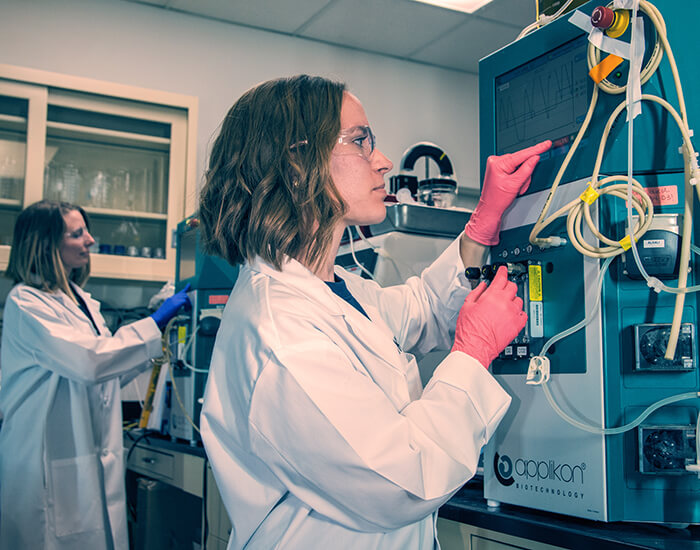The rapid growth in critical life science industries is astounding, but is heavily driven by professionals who possess a high degree of knowledge and skills in life sciences, mathematics, engineering, and business. Commonly known as bioprocess engineers, these individuals serve as the backbone of multiple life sciences industries by aiding in the creation of biomanufacturing platforms, product research and development strategies, process evaluation, and more.
Bioprocess engineering leans heavily on individuals who are capable of translating the complexity of both biomedical research and engineering into actionable processes that lead to the creation of new products.
What does bioprocess engineering mean?
A bioprocess is any process that uses living cells to create a product, while engineering is the science of designing and building complex machines or processes. To that end, bioprocess engineering is the planning, construction, execution, and revision of the biological and mechanical processes required to create new products within the life sciences.
Engineering of this type can be expansive, given the complex nature of the intersecting scientific fields. Bioprocess engineers require advanced knowledge in and understanding of systems engineering, chemistry, biology, and government regulations.
These facets combine to help bioprocess engineers do everything from discovering new drugs based on chemical combinations and deconstruction to creating the multi-step process involved in manufacturing a new drug or other biological product.
What does a bioprocess engineer do?
Employers may list a variety of duties for bioprocess engineers. Developing and revising manufacturing processes is a common requirement for the role. Bioprocess engineers are often tasked with utilizing their knowledge and skills in math, chemistry, biology, and engineering.
Other common bioprocess engineering duties may include:
- Research into the production of new products
- Experimentation
- Process troubleshooting and maintenance
- Process evaluation
- Data analysis
- Report writing
- Laboratory equipment purchasing and management
- Evaluation of regulatory submissions
Which industries use or need bioprocess engineering?
Bioprocess engineering and its practitioners are essential in every industry that relies on biological products. While pharmaceutical companies commonly hire bioprocess engineers to help create and organize manufacturing processes for new drugs and treatments, they are not the only type of employer that may hire bioprocess engineers.
Available jobs for bioprocess engineers also exist in the agricultural, chemical, energy, and waste management sectors, among many others.
Given that the medical industries hire the majority of bioprocess engineers, you may also see the job title listed under other names, including biomedical engineering and biochemical engineering.
How much do bioprocess engineers make?
The distinctly technical nature of the role helps ensure bioprocess engineers are extremely well compensated for their work.
According to the US Bureau of Labor Statistics (BLS), the median salary for a biomedical engineer was over $91,000 in 2019. The BLS anticipates moderate growth in demand for this role over the next decade.
How do I become a bioprocess engineer?
Jumpstart your career as a bioprocess engineer when you earn a Master of Biopharmaceutical Engineering (MEng) degree from Keck Graduate Institute (KGI). Our MEng program delivers hands-on courses in the essential tools, knowledge, and experiences you’ll need to find a job in the pharmaceutical industry.
The two-year MEng program at KGI emphasizes:
- Biopharmaceutical Product Design
- Industrial Bioprocess Research and Development
- Risk-Based Quality-by-Design Approach to Biomanufacturing
- Bioprocess Technology Innovation
Learn directly from industry experts as you take courses in either the engineering track or the science track.
The curriculum includes courses that cover in-demand knowledge areas such as:
- Bioprocess Engineering Principles
- Molecular Basis of Disease
- Principles of Bioreaction Engineering
- Bioseparation Engineering Science
- Biotechnology and Emerging Therapeutics
- Planning and Management of Research and Development
- Fluid Flow, Heat Transfer, & Mass Transfer Bioprocess Operations
- Bioprocess Business Plan and Entrepreneurship
Complete your degree program with a team-based capstone project and find internship opportunities that will fast-track your engagement with professionals and businesses in the field.
Get started today. Contact KGI to learn more about admission requirements, curriculum and program details, and financial aid opportunities.
